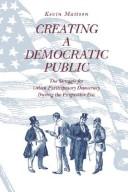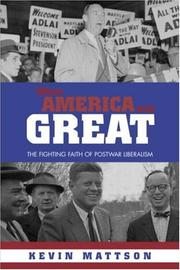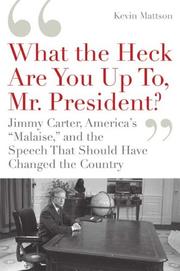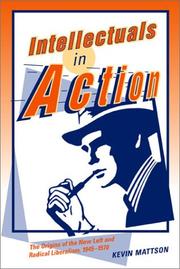| Listing 1 - 10 of 13 | << page >> |
Sort by
|

ISBN: 0271017236 Year: 1998 Publisher: University Park, Pa. Pennsylvania State University Press
Abstract | Keywords | Export | Availability | Bookmark
 Loading...
Loading...Choose an application
- Reference Manager
- EndNote
- RefWorks (Direct export to RefWorks)
Progressisme (Amerikaanse politiek) --- Progressisme (Politique américaine) --- Progressivism (United States politics) --- 973 --- Geschiedenis van de Verenigde Staten van Amerika (USA) --- 973 Geschiedenis van de Verenigde Staten van Amerika (USA) --- Political culture --- Political participation --- History --- United States --- Politics and government --- 1865-1933 --- Zueblin, Charles --- Howe, Frederic --- Follett, Mary Parker --- Community centers --- 19th-20th centuries --- Social conditions --- 1865-1918
Book
ISBN: 1281776416 9786611776411 0813545102 9780813545103 0813543436 9780813543437 Year: 2008 Publisher: New Brunswick, N.J. : Rutgers University Press,
Abstract | Keywords | Export | Availability | Bookmark
 Loading...
Loading...Choose an application
- Reference Manager
- EndNote
- RefWorks (Direct export to RefWorks)
Do you ever wonder why conservative pundits drop the word “faggot” or talk about killing and then Christianizing Muslims abroad? Do you wonder why the right’s spokespeople seem so confrontational, rude, and over-the-top recently? Does it seem strange that conservative books have such apocalyptic titles? Do you marvel at why conservative writers trumpeted the “rebel” qualities of George W. Bush just a few years back? There is no doubt that the style of the political right today is tough, brash, and by many accounts, not very conservative sounding. After all, isn’t conservatism supposed to be about maintaining standards, upholding civility, and frowning upon rebellion? Historian Kevin Mattson explains the apparent contradictions of the party in this fresh examination of the postwar conservative mind. Examining a big cast of characters that includes William F. Buckley, Whittaker Chambers, Norman Podhoretz, Irving Kristol, Kevin Phillips, David Brooks, and others, Mattson shows how right-wing intellectuals have always, but in different ways, played to the populist and rowdy tendencies in America’s political culture. He boldly compares the conservative intellectual movement to the radical utopians among the New Left of the 1960's and he explains how conservatism has ingested central features of American culture, including a distrust of sophistication and intellectualism and a love of popular culture, sensation, shock, and celebrity. Both a work of history and political criticism, Rebels All! shows how the conservative mind made itself appealing, but also points to its endemic problems. Mattson’s conclusion outlines how a recast liberalism should respond to the conservative ascendancy that has marked our politics for the last thirty years.
Conservatism --- Conservativism --- Neo-conservatism --- New Right --- Right (Political science) --- Political science --- Sociology --- History --- United States --- Politics and government

ISBN: 0203021045 9780203021040 0415947758 9780415947756 0415947766 1135936765 9781135936761 9786610169153 6610169152 128016915X 9781135936716 9781135936754 9780415947763 1135936757 Year: 2004 Publisher: New York : Routledge,
Abstract | Keywords | Export | Availability | Bookmark
 Loading...
Loading...Choose an application
- Reference Manager
- EndNote
- RefWorks (Direct export to RefWorks)
In the midst of Eisenhower's America, at the peak of the conservative Cold War era, a movement of thinkers and writers defined a pragmatic liberal vision for America. In this tale that will redefine the word "liberal" for a new generation, Mattson retraces the intellectual journey of these towering figures--from historians Arthur Schlesinger, Jr., and C. Vann Woodward, to economist John Kenneth Galbraith and theologian Reinhold Niebuhr. They served in the Second World War. They opposed communism but also wanted to make America's poor visible to the affluent society. Contrary to those who characterize liberals as naive or sentimental "bleeding hearts," they had a tough-minded and nuanced vision that stressed both human limitations and hope. They felt America should stand for something more than just a strong economy.--From publisher's description.
Liberalism --- History

ISBN: 9781596915213 Year: 2009 Publisher: New York [etc.] Bloomsbury
Abstract | Keywords | Export | Availability | Bookmark
 Loading...
Loading...Choose an application
- Reference Manager
- EndNote
- RefWorks (Direct export to RefWorks)
Book
ISBN: 9780271030685 Year: 2002 Publisher: University Park, PA
Abstract | Keywords | Export | Availability | Bookmark
 Loading...
Loading...Choose an application
- Reference Manager
- EndNote
- RefWorks (Direct export to RefWorks)
Digital
ISBN: 9780271030685 Year: 2002 Publisher: University Park, Pa Penn State University Press
Abstract | Keywords | Export | Availability | Bookmark
 Loading...
Loading...Choose an application
- Reference Manager
- EndNote
- RefWorks (Direct export to RefWorks)
Multi
ISBN: 9780813545103 9780813543437 0813545102 0813543436 Year: 2008 Publisher: New Brunswick, N.J. Rutgers University Press
Abstract | Keywords | Export | Availability | Bookmark
 Loading...
Loading...Choose an application
- Reference Manager
- EndNote
- RefWorks (Direct export to RefWorks)

ISBN: 0271021489 0271030682 Year: 2002
Abstract | Keywords | Export | Availability | Bookmark
 Loading...
Loading...Choose an application
- Reference Manager
- EndNote
- RefWorks (Direct export to RefWorks)
Book
ISBN: 0190908246 9780190908256 Year: 2020 Publisher: Oxford University Press,
Abstract | Keywords | Export | Availability | Bookmark
 Loading...
Loading...Choose an application
- Reference Manager
- EndNote
- RefWorks (Direct export to RefWorks)
"After the blast, Kurt Cobain's body slumped. Next to his corpse lay a piece of paper with his last words. At the time the bullet seared his head, Cobain was a rock star, his grizzled face graced the covers of slick music industry magazines, his songs received mainstream radio play, his band Nirvana performed in huge arenas. But he had been thinking an awful lot about what he called the "punk rock world" that saved his life during his teen years and that he had subsequently abandoned for stardom. He first encountered this world in the summer of 1983, at a free show the Melvins held in a Thriftway parking lot. After hearing the guttural sounds and watching kids dance by slamming against one another, he ran home and wrote in his journal: "This was what I was looking for," underlined twice. As he dove into this world, he recognized its blistering music played in odd venues, but also a wider array of creativity, like self-made zines, poetry, fiction, movies, artwork on flyers and record jackets, and even politics. This too: how all of these things opened up spaces for ideas and arguments. Now in his suicide note he reflected on his "punk rock 101 courses," where he learned "ethics involved with independence and the embracement of your community."2 There are people who can recount where they were when Cobain's suicide became news. I was in Ithaca, NY, finishing up my dissertation... but my mind immediately hurled backwards to growing up in Washington, D.C.'s "metropolitan area" (euphemism for suburban sprawl). I started to remember the first time I entered this "punk rock world." Around a year or two before Cobain went to the Thriftway parking lot, I opened the doors of the Chancery, a small club in Washington, D.C., and witnessed a tiny little stage, maybe a foot and a half off the ground. Suddenly, a small kid about my age (fifteen), his hair bleached into a shade of white that glowed in the lights, jumped up. I remember it being brighter than expected (unlike my earlier, wee-boy experiences in darkened, cavernous arenas where bands like Kiss or Cheap Trick would play to me and thousands of stoned audience members). This kid with the blond hair might have said something, I don't remember, what I recall is that his band broke into the fastest, most vicious sounding music I had ever heard. Suddenly bodies started flying through the air, young men (mostly) propelling themselves off the ground into the space between one another, flailing their arms, skin smacking skin. Control was lost, for when a body moved in one direction, another body collided into its path. When someone fell over, another would pick him up. The bodies got pushed onto the stage, making it hard to differentiate performer from audience member. At one moment it appeared the singer had been tackled by a clump of kids, and he seemed to smile. Sometimes, I could even make out what the fifteen-year old was shouting, especially, "I'm going to make their society bleed!" Overwhelmed, I rushed outside to clear my head"--

ISBN: 9786612360190 1282360191 0520940563 9780520940567 9780520249196 0520249194 9780520250710 0520250710 9781282360198 6612360194 Year: 2007 Publisher: Berkeley : University of California Press,
Abstract | Keywords | Export | Availability | Bookmark
 Loading...
Loading...Choose an application
- Reference Manager
- EndNote
- RefWorks (Direct export to RefWorks)
American liberalism today is in a state of confusion and disarray, with the "L word" widely considered a term of derision. By examining both the historical past and the fractious present, Liberalism for a New Century restores a proud political tradition and carves out a formidable defense of its philosophical tenets. This manifesto for a New Liberalism issues an urgent and cogent call for the most important rethinking of its values since the late 1960's, when conservatives reenergized themselves after Barry Goldwater's infamous loss. The essays in this volume, most of them never before published, are written by a leading group of historians, journalists, and public intellectuals. Some of the nation's most highly respected liberal minds explore such topics as the classical liberal tradition, postmodernism's challenge to the American "Enlightenment," the civil rights era, the influence of twentieth-century radicals on American liberalism, the 1950's, tolerance, the cold war, and whether liberalism should have a large and aggressive vision. One essay considers liberalism in Iran and what American liberals might learn from this movement. Fast-paced and encompassing such hot-button issues as the family and religion, here are ringside-seat arguments between people who don't often get to engage with one another: right-leaning liberals like Peter Berkowitz and John Patrick Diggins, and leftier liberals like Michael Tomasky and Mona Harrington. The result is a lively and stimulating collection that articulates a clear-minded alternative to the conservative ascendancy in American history and offers a timely and essential contribution to the growing national debate.
Liberalism --- Liberal egalitarianism --- Liberty --- Political science --- Social sciences --- United States --- Politics and government --- 20th century american radicals. --- america political philosophy. --- american enlightenment. --- american history. --- american liberalism. --- american politics. --- civic. --- civil rights era. --- classical liberalism. --- cold war. --- democracy. --- diplomacy. --- family and religion. --- john patrick diggins. --- liberal. --- liberalism and american values. --- liberalism in iran. --- liberalism. --- michael tomasky. --- mona harrington. --- national debate. --- new liberalism. --- peter berkowitz. --- political ideology. --- postmodernism. --- postmodernity. --- tolerance.
| Listing 1 - 10 of 13 | << page >> |
Sort by
|

 Search
Search Feedback
Feedback About UniCat
About UniCat  Help
Help News
News